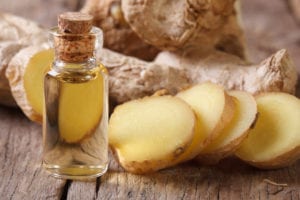Written by Taylor Woosley, Staff Writer. 12-week ginger supplementation at 500 mg three times a day resulted in significantly reduced IL-17 levels (p = 0.003), along with a significant reduction in the Expanded Disability Status Scale (p < 0.001).
 Multiple sclerosis (MS) is a chronic, inflammatory disease of the central nervous system, typically affecting adults between 20 and 40 years of age.1 MS is characterized by two pathological hallmarks: inflammation with demyelination and astroglial proliferation and neurodegeneration2. MS has been clinically associated with inflammatory and oxidative stress mediators including cytokines such as IL-1β, IL-6, IL-17, TNF-α, and INF-γ3.
Multiple sclerosis (MS) is a chronic, inflammatory disease of the central nervous system, typically affecting adults between 20 and 40 years of age.1 MS is characterized by two pathological hallmarks: inflammation with demyelination and astroglial proliferation and neurodegeneration2. MS has been clinically associated with inflammatory and oxidative stress mediators including cytokines such as IL-1β, IL-6, IL-17, TNF-α, and INF-γ3.
Ginger possesses various biological activities such as anti-inflammatory and antioxidant properties4. Its anti-inflammatory abilities include immune response modulation during the cellular phase5. Research has shown that ginger can suppress pro-inflammatory cytokines such as IL-8 and IL-1β, effectively reducing inflammation6.
Foshati et al. conducted a randomized controlled study to assess the effect of ginger supplementation on disability status, physical and psychological quality of life (QoL), body mass index (BMI), IL-17, matrix metalloproteinase (MMP-9), and neutrophil to lymphocyte ratio (NLR) in subjects with relapsing-remitting MS (RRMS). Subject inclusion consisted of participants with confirmed RRMS, who were men or non-menopausal women aged 18 to 50 years old, with a score of ≤4.5 in the Expanded Disability Status Scale (EDSS), who had not experienced a MS relapse or corticosteroid therapy for the past 3 months and had no change in type or dose of MS medication for the past 6 months.
All subjects took part in a three-week run-in period in which they were requested to avoid consuming ginger and to maintain normal physical activity levels and dietary intake. Subjects were then assigned to the ginger treatment group or the control. The ginger group received 500 mg ginger tablets while the control group received corn tablets 3 times daily with meals for 12 weeks. Each 500 mg ginger tablet contained 25 mg of gingerols. Disability status was assessed through physical examination by an experienced neurologist using the EDSS. The Multiple Sclerosis Impact Scale (MSIS-29) is a 29-item self-report questionnaire that was utilized by subjects to rate physical and psychological QoL. Fasted blood samples were obtained, and ELISA kits were utilized to measure serum levels of IL-17, MMP-9, and neurofilament light chain (NfL). A Sysmex XP-300 was used to determine absolute counts of neutrophils and lymphocytes.
Independent t-test, chi-square test, or Fisher’s exact test was utilized for between-group comparisons of demographic and medical characteristics, dietary intake, and physical activity. A total of 25 subjects in the ginger treatment group and 24 subjects in the control group completed the study. There was no significant difference between the two groups regarding demographic and baseline characteristics. Significant findings of the study are as follows:
- Ginger supplementation significantly reduced EDSS scores compared with the control group (-0.54 ±58 vs. 0.08 ± 0.23, p < 0.001). Furthermore, MSIS-29 physical scores were significantly reduced in the ginger group compared to the control (-8.15 ± 15.75 vs. 4.23 ± 8.46, p = 0.001), along with MSIS-29 psychological scores (-15.71 ± 19.59 vs. 6.68 ± 10.41, p < 0.001).
- The ginger group experienced significantly reduced serum concentrations of IL-17 compared with the control (-3.34 ±06 vs. 1.77 ± 6.51 ng L-1, p = 0.003).
Findings of the study show that 12-week supplementation of 500 mg ginger three times daily significantly reduced EDSS, IL-17 levels, and MSIS-29 physical and psychological scale scores. Ginger may be an effective adjuvant therapy to improve QoL and reduce inflammatory levels for participants with RRMS. Study limitations include the potential lack of generalizability to other forms of MS due to only using subjects with RRMS.
Source: Foshati, Sahar, Maryam Poursadeghfard, Zahra Heidari, and Reza Amani. “The effect of ginger (Zingiber officinale) supplementation on clinical, biochemical, and anthropometric parameters in patients with multiple sclerosis: a double-blind randomized controlled trial.” Food & Function 14, no. 8 (2023): 3701-3711.
© The Royal Society of Chemistry 2023
Click here to read the full text study.
Posted June 19, 2023.
Taylor Woosley studied biology at Purdue University before becoming a 2016 graduate of Columbia College Chicago with a major in Writing. She currently resides in Glen Ellyn, IL.
References:
- Klineova S, Lublin FD. Clinical Course of Multiple Sclerosis. Cold Spring Harbor perspectives in medicine. Sep 4 2018;8(9)doi:10.1101/cshperspect.a028928
- Hauser SL, Cree BAC. Treatment of Multiple Sclerosis: A Review. Am J Med. Dec 2020;133(12):1380-1390.e2. doi:10.1016/j.amjmed.2020.05.049
- Stoiloudis P, Kesidou E, Bakirtzis C, et al. The Role of Diet and Interventions on Multiple Sclerosis: A Review. Nutrients. Mar 9 2022;14(6)doi:10.3390/nu14061150
- Arcusa R, Villaño D, Marhuenda J, Cano M, Cerdà B, Zafrilla P. Potential Role of Ginger (Zingiber officinale Roscoe) in the Prevention of Neurodegenerative Diseases. Front Nutr. 2022;9:809621. doi:10.3389/fnut.2022.809621
- Ballester P, Cerdá B, Arcusa R, Marhuenda J, Yamedjeu K, Zafrilla P. Effect of Ginger on Inflammatory Diseases. Molecules. Oct 25 2022;27(21)doi:10.3390/molecules27217223
- Song MY, Lee DY, Park SY, et al. Steamed Ginger Extract Exerts Anti-inflammatory Effects in Helicobacter pylori-infected Gastric Epithelial Cells through Inhibition of NF-κB. J Cancer Prev. Dec 30 2021;26(4):289-297. doi:10.15430/jcp.2021.26.4.289
